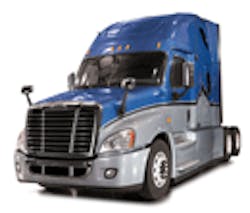MIAMI. The U.S. trucking industry is quite familiar with the concept of “vertical integration,” a strategy whereby truck makers seek to offer a range of proprietary components in their vehicles – from axles to transmissions and engines – in order to capture more of the customer’s dollars.
Yet David Hames, gm of marketing and strategy for Daimler Trucks North America (DTNA), believes “vertical integration” is in many ways an inaccurate and outdated term – one that DTNA is instead replacing with a “vehicle integration” concept it plans to pursue heavily over the next few years.
“Vehicle integration is more than just bringing proprietary components into the market,” he explained at a media event here at the Fontainebleau hotel in Miami as part of DTNA’s rebranding effort for its Detroit component subsidiary, formerly known as Detroit Diesel Corp. “It’s about providing a fully integrated powertrain to the U.S. truck market – engine, axles and transmission – that gives us both, the OEM and customer, a competitive advantage. For the customer, that advantage translates into better fuel economy, lower total cost of operation, and more vehicle uptime.”
(Video: Watch as DTNA’s David Hames explains the advantages of vehicle integration.)
The first piece of that integrated powertrain offering is a complete family of heavy- and medium-duty axles developed by DTNA’s Detroit subsidiary for its Freightliner Trucks, Western Star, Thomas Built Bus and Freightliner Custom Chassis (FCCC) vehicles, that joins Detroit’s more well-known line of diesel truck engines.
Hames added that the second piece of that powertrain package, a DTNA-only transmission for the U.S. market, is currently in what he called “the evaluation phase.”
“We’re currently evaluating a Mercedes Benz automated mechanical transmission [AMT] in several Cascadia [Class 8 tractor] test vehicles right now,” he said. “We see a significant opportunity to provide fuel economy and performance gains for customers by offering our own AMT in conjunction with our own axles and engines as a complete package to the customer. The time is right to bring such a package to the market.”
Hames noted that DTNA plans to focus on offering an integrated powertrain in the on-highway segment first, followed by medium-duty, vocational, and other commercial applications.
He added that providing a DTNA-only AMT integrated with axles and engine provides the “missing link” in terms of maximizing fuel economy for U.S. fleets.
“While the best drivers with a manual transmission can match or beat an AMT in terms of fuel economy, they are the exception now, not the rule,” Hames explained. “Fleets now must manage a mix of drivers and an AMT helps raise everyone’s fuel economy performance up closer to the top guys.”
“We expect to go further than traditional propulsion systems with Detroit, to take on whatever comes our way,” he said. “That means offering complete powertrain solutions for many different markets and applications. This is not a sideline project for us; it’s part of our aggressive growth plan.”
About the Author
Sean Kilcarr
Editor in Chief
Sean Kilcarr is a former longtime FleetOwner senior editor who wrote for the publication from 2000 to 2018. He served as editor-in-chief from 2017 to 2018.
